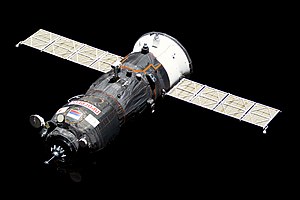 Progress MS-11 spacecraft in space | |
| Country of origin | Soviet Union / Russia |
|---|---|
| Operator | Roscosmos |
| Applications |
|
| Specifications | |
| Spacecraft type | Cargo |
| Payload capacity | 2,400 kg (5,300 lb) |
| Volume | 7.6 m3 (270 cu ft) |
| Design life | 180 days docked to a space station[a] |
| Dimensions | |
| Length | 7.23 m (23.7 ft) |
| Diameter | 2.72 m (8 ft 11 in) |
The Progress (Russian: Прогресс) is a Russian expendable cargo spacecraft. Its purpose is to deliver the supplies needed to sustain a human presence in orbit. While it does not carry a crew, it can be boarded by astronauts when docked to a space station, hence it is classified as crewed by its manufacturer.[1][2][3] Progress is derived from the crewed Soyuz spacecraft and launches on the same launch vehicle, a Soyuz rocket.
Progress has supported space stations as early as Salyut 6 and as recently as the International Space Station (ISS). Each year there are between three and four Progress flights to the ISS. A Progress remains docked until shortly before being replaced with a new one or a Soyuz (which will use the same docking port). Then it is filled with waste, disconnected, and de-orbited, at which point it burns up in the atmosphere. Due to the variation in Progress vehicles flown to the ISS, NASA uses its own nomenclature where "ISS 1P" means the first Progress spacecraft to ISS.
Progress was developed because of the need for a constant source of supplies to make long duration space missions possible. It was determined that cosmonauts needed an inflow of consumables (food, water, air, etc.), plus there was a need for maintenance items and scientific payloads that necessitated a dedicated cargo carrier. Such payloads were impractical to launch with passengers in the restricted space of a Soyuz. As of 15 February 2021, there have been 168 Progress flights with three failures. All three failures occurred between 2011 and 2016.
Cite error: There are <ref group=lower-alpha> tags or {{efn}} templates on this page, but the references will not show without a {{reflist|group=lower-alpha}} template or {{notelist}} template (see the help page).
- ^ "Progress". Encyclopedia Astronautica. Archived from the original on 26 December 2001. Retrieved 29 March 2013.
- ^ "Return to selections: 1". Spacecraft Names. Archived from the original on 6 February 2012. Retrieved 29 March 2013.
- ^ "Russian Designations". Encyclopedia Astronautica. Archived from the original on 23 October 2012. Retrieved 29 March 2013.